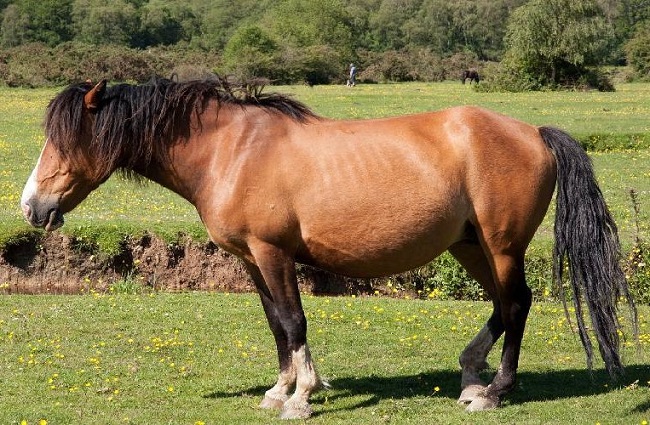
Horses don’t need a lot of sleep. While they rest frequently, they spend only 1 to 4 hours sleeping each day. This is typical of prey animals who are vulnerable when they sleep. Over a period of 24 hours, the average horse will be drowsy for about two hours, sleep lightly for two hours, and sleep deeply for less than an hour. But these are totals. Each day, the horse has several drowsy and sleep periods of only a few minutes each. The horse can sleep lying down, but they can also sleep standing.
Lying Down Versus Standing Sleep
The horse can sleep lying down if it so chooses but lying down places stress on their internal organs. Most horse people know they can sleep standing up, but how? Horses have a “stay” apparatus in their front and hind legs that allow them to sleep standing up. The horse just relaxes his front legs to trigger the stay apparatus; in the hind leg, the rotation of the hips (the horse typically rests his weight on one hind leg) triggers the hammock-like locking mechanism.
Stabled Versus Pastured Horses
Studies of feral and domestic horses shows that horses take “power naps.” In pastured situations, horses use the buddy system, one horse keeps watch while others sleep, to get the rest they need while keeping safe from predators. Stabled horses are isolated from their buddies, so they are not as comfortable sleeping in their stalls. Veterinarians who study horse sleep have observed that horses stabled next to each other rest standing against the two sides of their shared stall wall, probably to try to be near a buddy. While we think of our horses as “safe” in their stalls, horses may not sleep as well in a stall. Evidence suggests that pastured horses sleep more than stabled horses and they get more down time. Stabled horses usually sleep during the low activity times of the barn (evening and early morning hours).
REM Sleep in Horses
REM sleep can only be achieved when lying down. Horses that either can’t or won’t lie down may be at risk for sleep deprivation. Dr. Joe Bertone, Professor of Equine Medicine at Western University of Health Sciences, studies sleep deprivation. He reports that horses need between 30 and 60 minutes of REM sleep each day, and that after 7 to 14 days of being deprived of this sleep will begin to fall asleep (collapse) at odd times, without notice. If your horse shows signs of sleep deprivation, check: his/her ability to lie down physically. Is he in pain? Does he have trouble getting up? His environment. Is it always noisy? Hectic? Loud? Emotional issues. Too nervous to lie down? Afraid of not being able to rise?
Related Articles & Free Email Newsletter Sign Up
Clydesdale Horses Offer Size, Strength, and a Gentle Nature
How Positive Reinforcement in Training Improves Horse Memory




Comment here